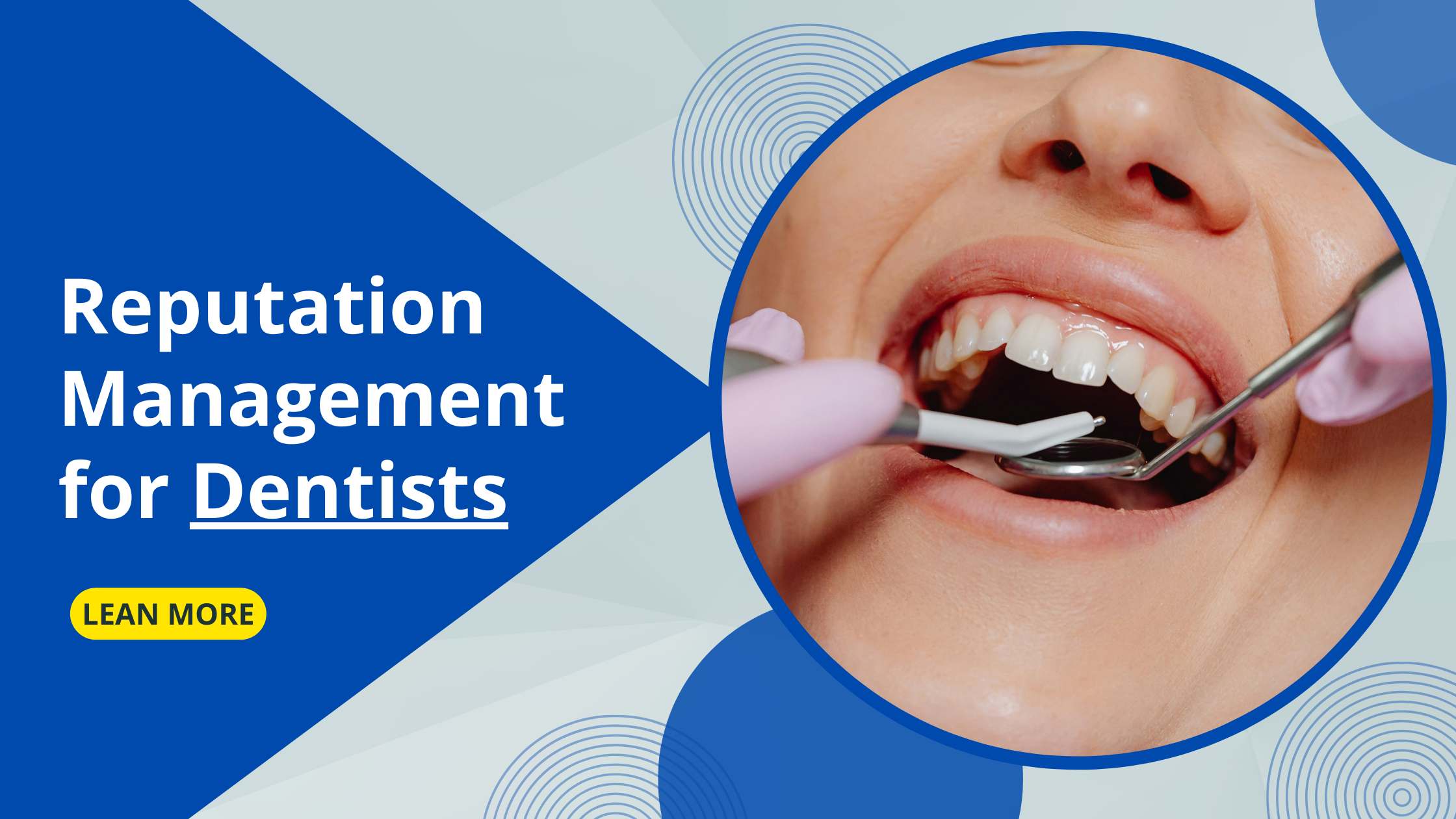For dentists today, a strong reputation is as vital as clinical skills. Patients go beyond traditional word-of-mouth referrals, increasingly consulting Google, Yelp, Healthgrades, and social media platforms to choose where to schedule their next dental visit. Unfortunately, even one frustrated patient leaving a harsh review can heavily impact a dentist’s practice. Negative reviews not only damage credibility but also create hesitation in potential patients who are considering treatment. Since dental services are personal and trust-driven, reputation plays a central role in attracting and retaining clients.
While excellent dentistry is non-negotiable, the reality is that online perception often overshadows expertise. For this reason, more and more dental professionals are turning to online reputation management (ORM) services to safeguard their brand, address unfair criticism, and highlight the positive patient experiences that often go unnoticed.
Table of Contents
- Dentists Struggle to Attract New Patients Due to Negative Reviews
- U.S. Dental Industry and the Impact of Negative Reviews
- Key Reasons Dentists Receive Negative Reviews?
- Cases Where Dentists Lose Customers Due to Bad Reputation
- Platforms Where Patients Post Negative Reviews About Dentists
- Government Guidelines for Dentists
- Importance of Having a Google Business Profile for Dentists
- Why Dentists Need to Take Care of Their Online Reputation
- Investing in Online Marketing & Branding to Build Reputation
- How ReputaForge Helps Dentists Repair Their Online Reputation
- Conclusion
- FAQs
Dentists Struggle to Attract New Patients Due to Negative Reviews
In a competitive market where patients have countless dental providers to choose from, standing out can be difficult. Negative reviews only amplify this struggle, making it harder for dentists to secure new patients. Studies show that people tend to remember and act on negative feedback more than positive. For a dental practice, this means a single poor review—whether justified or not—can overshadow hundreds of satisfied patients.
From long appointment waiting times to miscommunication about costs, patients can and often do vent frustrations online. What’s particularly challenging is that once the review is posted publicly, it begins influencing hundreds of prospective patients, even if the issue was minor or already resolved. Unlike in the past when dissatisfaction stayed private, today’s digital platforms magnify complaints to a wide audience instantly.
U.S. Dental Industry and the Impact of Negative Reviews
The dental industry in the U.S. is enormous, with more than 200,000 practicing dentists and a projected market size of over $172 billion in 2025 (source: American Dental Association). With such growth and population demand, one might assume dentists never struggle with attracting patients. However, research highlights a serious counterforce: 84% of people trust online reviews as much as a personal recommendation.
According to a BrightLocal survey, over 57% of patients will not book an appointment with a healthcare provider who has less than a 4-star rating online. The numbers get more alarming when you consider that dental practices typically operate on slim local competition. One poor Yelp or Google rating can cause a significant portion of high-value patients—especially cosmetic and family dentistry clients—to choose another provider. In such cases, reputation is not simply about pride; it is directly tied to revenue.
Key Reasons Dentists Receive Negative Reviews?
Negative reviews don’t fall from the sky. The root causes often point to common areas where patient expectations and delivery don’t align. For dentists, these reasons frequently include:
- Long Wait Times: Patients want efficiency. Even if the treatment is stellar, frustration mounts if they wait 30–60 minutes beyond their scheduled slot.
- Billing Issues: Dental insurance complexities and unexpected out-of-pocket costs often lead to negative impressions.
- Poor Communication: Patients expect clear explanations about procedures, costs, and aftercare. When communication breaks down, they feel uninformed and undervalued.
- Staff Behavior: Receptionists and support staff play a huge role. A rude or dismissive front desk experience can overshadow great dental care.
- Post-Treatment Complications: Even if complications are common or unavoidable, patients may assume fault lies with the dentist, resulting in unfavorable reviews.
- Customer Service Culture: Many practices focus heavily on clinical outcomes but ignore service experience, which is often the root of online reviews.
Cases Where Dentists Lose Customers Due to Bad Reputation
Instances of reputational damage are everywhere. Consider a dentist who had a 3.2-star rating on Google due to just five negative reviews. Despite successfully treating hundreds of patients, new booking inquiries dropped sharply because prospective patients filtered them out in searches.
Another case involved a cosmetic dentist whose Yelp reviews accused the practice of being “all about money,” suggesting unnecessary upselling. Despite providing advanced aesthetic services, the perception of being profit-driven eroded trust and discouraged high-value clientele.
Such examples underline that reputation is not always about truth; it is about perception—and perception, in the digital age, dictates success.
Platforms Where Patients Post Negative Reviews About Dentists
Dentists should be aware of the online ecosystems where patients share their experiences most frequently. The most influential platforms include:
- Google Reviews – The first and most prominent platform patients rely on, tied directly to local map searches.
- Yelp – Especially popular in urban markets; Yelp reviews carry significant influence.
- Healthgrades – A specialized platform focusing on healthcare providers, including dentists.
- Facebook & Instagram – Negative comments or stories can circulate quickly on social platforms.
- Zocdoc – As a booking platform, reviews directly affect appointment requests.
Each of these platforms has algorithms that give prominence to consistent reviews. For dentists, maintaining proactive management across these sites is crucial.
Government Guidelines for Dentists
Dentists in the U.S. are guided by a set of government-endorsed standards and recommendations that ensure safe, evidence-based, and patient-centered care. These guidelines are issued and regularly updated by authoritative bodies such as the American Dental Association (ADA), the Centers for Disease Control and Prevention (CDC), and organizations like the American Dental Hygienists’ Association (ADHA).
Some key highlights of these guidelines include:
- Clinical Practice Standards by the ADA: The ADA provides evidence-based clinical practice guidelines across a spectrum of dental treatments—from managing dental pain, caries treatment approaches, fluoride use in pediatric patients, to antibiotic prescribing protocols. These guidelines help dentists align treatments with the latest scientific evidence tailored to patient needs and preferences, thus enhancing the quality of care and patient safety.
- Updated Standards for Dental Hygiene Practice (2026): The ADHA updated its Standards for Clinical Hygiene Practice, emphasizing a comprehensive and patient-centered approach. These standards focus on five core phases—assessment, diagnosis, planning, implementation, and evaluation—along with thorough documentation. Notably, the updates reflect greater attention to systemic diseases, social determinants of health affecting oral care, and the importance of patient communication and consent.
- Infection Prevention and Control: The CDC sets forth detailed protocols on infection prevention in dental settings to protect both patients and staff. These include sterilization, use of personal protective equipment (PPE), and environmental controls, essential for maintaining safety standards in clinical practice.
- Environmental Regulations: The EPA regulates dental office waste, specifically requiring the use of amalgam separators to reduce mercury discharge into wastewater systems, supporting environmental safety.
- Pediatric Dentistry Policies: The American Academy of Pediatric Dentistry (AAPD) provides policies and recommendations specifically addressing the care of infants, children, and adolescents, including fluoride therapy, sedation use, and behavior management.
Dentists must remain compliant with these evolving guidelines not only to provide quality care but also to build trust and uphold their professional reputation. Aligning with government-endorsed standards and ensuring transparent patient communication can also help mitigate negative reviews related to clinical care and safety concerns.
Importance of Having a Google Business Profile for Dentists
In today’s digitally driven world, having a Google Business Profile (GBP) is no longer optional for dentists—it is essential. This free tool allows dental practices to establish a verified presence on Google Search and Google Maps, where most potential patients begin their journey.
A well-maintained Google Business Profile offers several critical advantages:
- Enhanced Local Visibility: When patients search for “dentist near me” or “best dentist in [city],” dental practices with optimized GBP listings appear prominently on search results and maps, often above organic listings. This visibility drives highly targeted local traffic.
- Showcase Reviews and Ratings: GBP displays patient reviews and ratings directly on search results, influencing appointment decisions instantly. Positive feedback here significantly boosts trust and credibility.
- Provide Essential Information: Dentists can share address, phone numbers, hours of operation, website links, and even special offers. This ensures patients have quick access to everything they need, improving convenience and increasing appointment bookings.
- Engage with Patients: Dentists can respond to reviews, post updates, and add photos showcasing their practice, staff, and successful treatment outcomes. This ongoing engagement fosters stronger patient relationships and combats negative reviews proactively.
- Leverage Insights: Google provides analytical tools that help dentists understand how patients find their profile, what actions they take, and where improvements can be made.
In summary, maintaining an up-to-date and actively managed Google Business Profile is a cornerstone of any dentist’s online reputation and marketing strategy. It builds instant trust, enhances discoverability, and drives meaningful patient engagement—foundations for long-term practice growth.
Why Dentists Need to Take Care of Their Online Reputation
Dental treatments often involve high costs, high trust, and long-term patient relationships. That makes reputation more critical than ever. Negative impressions not only deter patients but can also demoralize the dentist and the team.
Equally important, online reputation serves as free marketing. A dentist with strong reviews enjoys organic visibility on Google and attracts referrals without investing heavily in ads. On the flip side, a damaged reputation requires costly advertising just to compete, with no guarantee patients will trust the messaging.
In short: reputation fuels credibility, marketing efficiency, and growth simultaneously.
Investing in Online Marketing & Branding to Build Reputation
Dentists can no longer afford to separate clinical excellence from digital branding. Modern patients expect cohesive experiences—great treatment in person and glowing testimonials online. Some strategies include:
- Patient Testimonial Campaigns: Encourage satisfied patients to leave reviews on Google and Healthgrades.
- Professional Social Media Presence: Share before-and-after photos (with consent), dental care tips, and behind-the-scenes staff features.
- Branded Content Marketing: Publish articles or videos addressing common dental fears or myths, showcasing expertise and building authority.
- Crisis Management Strategies: Having a system to address negative reviews immediately and professionally.
When combined, these steps form the foundation for online reputation resilience.
How ReputaForge Helps Dentists Repair Their Online Reputation
Not all dentists can dedicate time and expertise toward digital reputation battles. That’s where branding and reputation management companies like ReputaForge step in. Their ORM services are tailored for dentists, offering:
- Review Monitoring & Response: Constantly scanning review sites and drafting professional, empathetic responses to criticism.
- Search Engine Optimization (SEO) for Dentists: Ensuring positive stories and patient testimonials rank higher on search engines than negative content.
- Content Creation & Promotion: Publishing blogs, press releases, and patient success stories to push down harmful reviews.
- Online Branding Strategies: Building dentist profiles that emphasize awards, certifications, and community involvement.
- Legal & Compliance Guidance: Helping address defamatory claims that may violate platform policies.
With dedicated ORM services, dentists can focus on their clinical work while experts handle their digital image—ensuring negative feedback does not define their practice.
Conclusion
Dentistry is built on trust, and in today’s online-driven world, trust is determined by digital perception. Negative reviews, whether legitimate or not, are unavoidable—but their consequences don’t have to be permanent. Effective online reputation management services allow dentists to regain control of their narrative, safeguard their credibility, and ultimately grow their patient base.
Investing in a dentist reputation management company such as ReputaForge helps practices not just recover from negative feedback but also thrive by promoting authentic, positive patient experiences. For dentists, reputation management isn’t just optional; it is a lifeline for sustained growth in a competitive market.
FAQs
Question 1. Can dentists remove negative reviews legally?
Answer: Not always. Reviews can only be removed if they violate platform policies (fake content, offensive remarks, spam). Otherwise, ORM strategies are used to minimize visibility.
Question 2. How long does it take for online reputation repair to show results?
Answer: On average, noticeable improvements in search rankings and review ratings appear within 3–6 months, depending on the scale of the issue.
Question 3. Should dentists respond to every review?
Answer: Yes, especially negative ones. Professional and empathetic responses show prospective patients that the dentist values feedback and takes patient concerns seriously.
Question 4. How much do reputation management services cost for dentists?
Answer: Costs vary. Small practices may spend $500–$1,500 monthly, while larger clinics may require comprehensive ORM packages, costing more.
Question 5. Is online reputation management only about reviews?
Answer: No. It also includes SEO, social media presence, branding content, and proactive reputation-building strategies.






